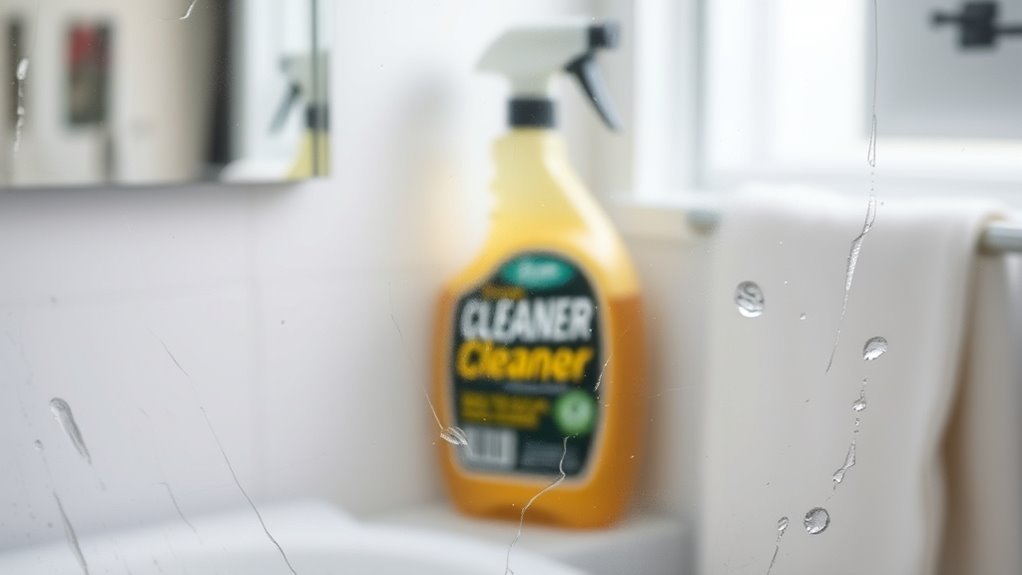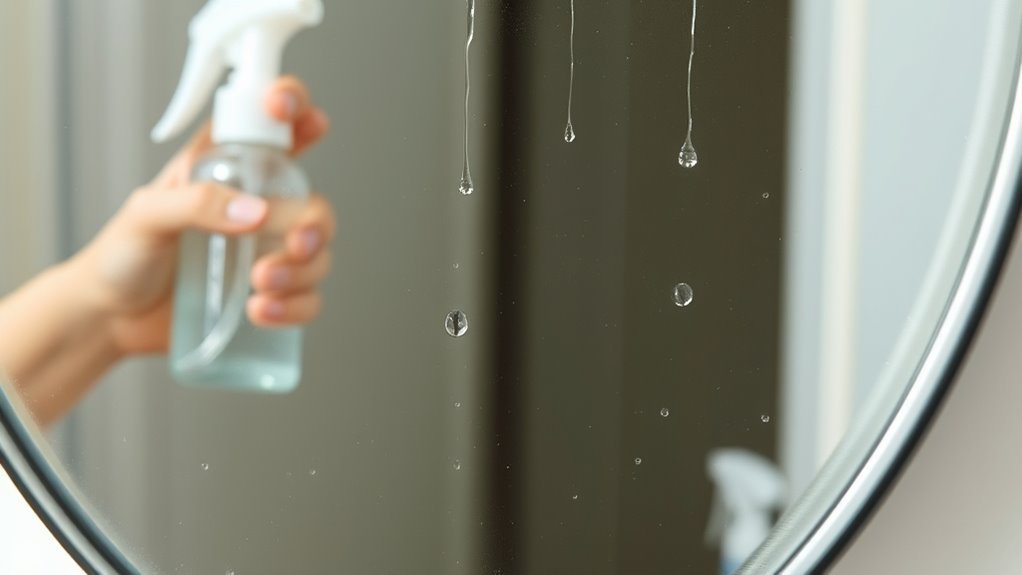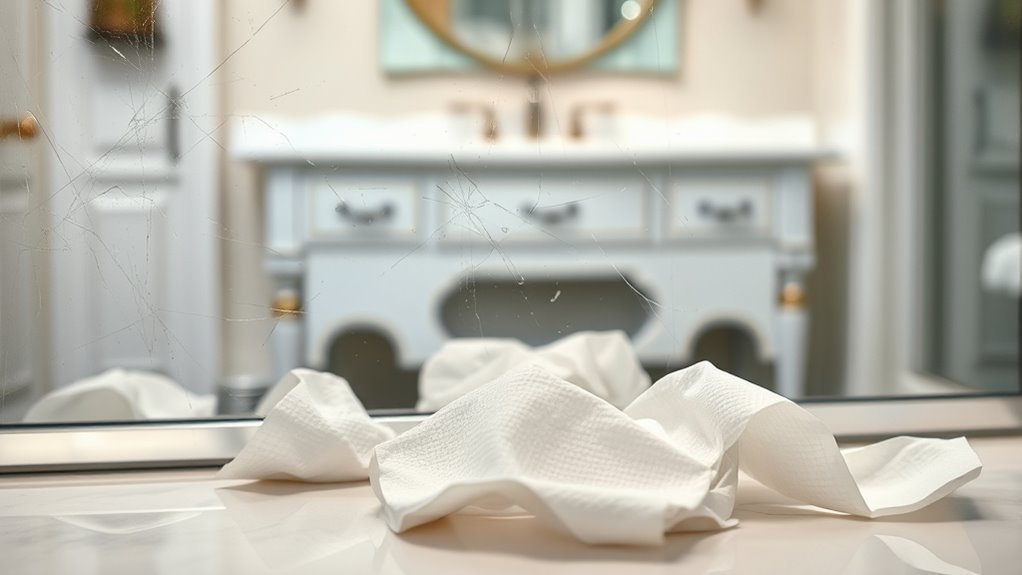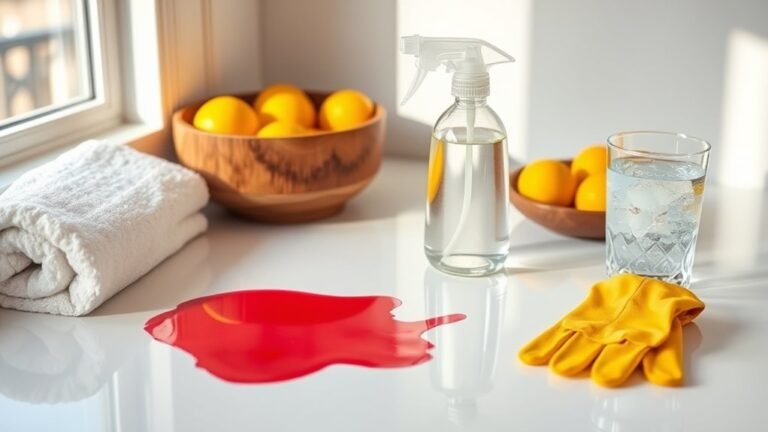Cleaning Mistakes That Damage Your Mirror
You might be damaging your mirror by using harsh chemicals that harm the delicate coatings and leave residue. Abrasive materials like steel wool or rough sponges can cause scratches, dulling its shine. Using too much water risks warping or discoloration, especially around edges. Paper towels leave lint, and cleaning in direct sunlight leads to streaks. Plus, neglecting the frame or scrubbing too hard can cause lasting damage. Keep these in mind, and you’ll soon discover how to clean your mirror safely and effectively.
Using Harsh Chemicals on Mirror Surfaces

One common mistake people make when cleaning mirrors is using harsh chemicals that can damage the surface. You might think stronger cleaners mean a streak-free shine, but those chemicals often leave behind residue that dulls your mirror’s brilliance. Mirrors have delicate coatings designed to reflect light perfectly, and harsh chemicals can eat away at these mirror coatings, leading to permanent damage. Instead of restricting yourself with aggressive products, opt for gentle, natural cleaners like diluted vinegar or mild soap. These choices respect your mirror’s integrity and free you from worrying about long-term harm. By avoiding chemical residue and protecting mirror coatings, you keep your reflection crystal clear while maintaining the freedom to clean without fear. Your mirror will thank you with lasting clarity and shine.
Cleaning Mirrors With Abrasive Materials
Although you might be tempted to scrub stubborn spots on your mirror, using abrasive materials can cause irreversible scratches and damage. Avoid abrasive sponges and steel wool, as their rough surfaces wear down the mirror’s coating, leaving unsightly marks. Instead, embrace gentler methods that preserve your mirror’s clarity and freedom from harm. Remember:
- Abrasive sponges can create fine scratches that dull the surface.
- Steel wool is too harsh and can strip protective layers.
- Harsh scrubbing leads to permanent damage, limiting your mirror’s lifespan.
- Using soft microfiber cloths is safer and more effective.
Applying Excess Water During Cleaning

Using too much water when cleaning your mirror can cause more harm than good. Excess water accumulation along the edges and backing can lead to damage like warping or discoloration. You want to avoid soaking the mirror; a lightly dampened cloth is enough to get the job done. Overdoing it doesn’t mean better results—it just invites issues. Instead, focus on your cleaning frequency to keep your mirror clear without risking harm. Regular, gentle cleaning prevents buildup and reduces the need for aggressive wiping with loads of water. Remember, freedom means taking control wisely—use just enough moisture, and you’ll keep your mirror shining without compromising its integrity. Stay mindful, and your mirror will reward you with lasting clarity.
Ignoring the Frame While Cleaning
Neglecting your mirror’s frame during cleaning is a common mistake that can shorten its lifespan. You might focus solely on the glass, but the frame materials need attention too. Ignoring frame care can lead to damage like warping, fading, or cracking. Different frame materials require specific cleaning methods, so don’t treat all frames the same.
Focusing only on the glass risks damaging your mirror’s frame through warping, fading, or cracking.
To keep your mirror’s frame in top shape:
- Identify the frame materials before cleaning
- Use gentle, appropriate cleaners for wood, metal, or plastic
- Avoid soaking the frame to prevent water damage
- Regularly dust the frame to maintain its finish
Using Paper Towels Instead of Microfiber Cloths

Why do you reach for paper towels when cleaning your mirror? It might seem convenient, but those paper towel drawbacks can actually cause more harm than good. They tend to leave behind lint and tiny scratches, dulling your mirror’s surface over time. Plus, they often soak up too much cleaning solution, making it harder to get a streak-free shine. Instead, switch to microfiber cloths and enjoy the microfiber benefits. These cloths trap dust and dirt without scratching, and they absorb liquid efficiently, giving your mirror a clear, polished finish. Choosing microfiber gives you the freedom to clean confidently, knowing your mirror stays pristine longer. So ditch the paper towels and embrace microfiber for a smarter, safer clean every time.
Cleaning Mirrors in Direct Sunlight
Although it might seem like a good idea to clean your mirror in direct sunlight, doing so can actually cause streaks and spots to dry too quickly, making your efforts less effective. When the sun hits the glass, the moisture evaporates fast, leaving behind uneven patches that ruin the streak free shine you want. Plus, sunlight reflections can trick you into missing spots or over-cleaning areas.
To avoid this mistake, try these tips instead:
- Clean mirrors in shaded or indoor areas
- Use a damp microfiber cloth for gentle wiping
- Dry with a separate, dry microfiber cloth immediately
- Avoid harsh sprays that dry too fast in sunlight
This way, you get a flawless, clear reflection without the hassle of stubborn streaks.
Neglecting Regular Cleaning and Maintenance
If you don’t clean your mirrors regularly, dust and grime can build up quickly, making it harder to get them spotless later. Sticking to a regular schedule not only keeps your mirror shining but also helps you avoid stubborn stains that require harsh cleaning. To enjoy the freedom of a crystal-clear reflection, incorporate simple maintenance tips like wiping down your mirror weekly with a soft, lint-free cloth and a gentle cleaner. Avoid letting moisture linger, as it can damage the backing over time. By committing to routine care, you prevent damage and extend your mirror’s life without extra hassle. Don’t wait for dirt to accumulate—embrace a consistent cleaning habit that keeps your mirror flawless and your space feeling fresh.
Rubbing Too Hard and Causing Scratches
You might think scrubbing harder gets your mirror cleaner, but it can actually cause scratches. Avoid abrasive materials like rough cloths or harsh sponges that damage the surface. Instead, use gentle techniques and soft fabrics to keep your mirror spotless without harm.
Abrasive Materials to Avoid
When cleaning mirrors, steering clear of abrasive materials is essential because rubbing too hard can easily cause scratches. You want to preserve that clear, flawless reflection without damage. Avoid abrasive cleaners that contain harsh chemicals or gritty particles—they’re too rough for delicate glass surfaces. Instead, use soft cloths to gently wipe away dirt and grime. Here are some abrasive materials to avoid:
- Steel wool or scouring pads
- Rough sponges or scrub brushes
- Harsh chemical cleaners with ammonia or bleach
- Paper towels or rough tissues that can leave fibers and scratches
Choosing the right tools lets you maintain your mirror’s shine without risking permanent marks. Keep your cleaning routine simple and free, protecting your mirror’s clarity effortlessly.
Gentle Cleaning Techniques
Although it might seem like scrubbing harder will clean your mirror better, applying too much pressure can actually cause scratches that dull its surface. You want your mirror to shine, not suffer from harsh treatment. Instead, opt for gentle cleaning techniques. Use soft microfiber cloths—they’re designed to lift dirt without damaging the glass. Pair them with a simple vinegar solution; it effectively cuts through grime without harsh chemicals. Spray the solution lightly, then wipe using smooth, circular motions. Avoid aggressive scrubbing or abrasive materials that can leave permanent marks. By treating your mirror with care, you preserve its clarity and enjoy that crisp, reflective freedom every day. Remember, delicate doesn’t mean less effective—it’s the secret to lasting shine.
Frequently Asked Questions
How Often Should I Replace My Mirror to Maintain Clarity?
Isn’t it true that time is the silent artist, gradually dulling what we once admired? When considering mirror replacement frequency, you don’t have to swap mirrors often—usually every 10 to 15 years suffices. But if you notice persistent cloudiness or damage that cleaning can’t fix, it’s time to act. For maintaining mirror clarity, regular gentle cleaning and avoiding harsh chemicals will keep your reflection as free and crisp as your spirit.
Can Fog-Resistant Sprays Damage Mirror Surfaces?
You might wonder if fog-resistant sprays can damage your mirror surface. Generally, they’re designed to protect, not harm, giving you clearer views even in steamy conditions. But if you’re not careful, some sprays with harsh chemicals could wear down the mirror’s coating over time. To keep your mirror surface safe and enjoy that fog-free freedom, always choose sprays made specifically for mirrors and follow the instructions closely.
Are There Eco-Friendly Alternatives to Traditional Mirror Cleaners?
Like a gentle breeze revitalizing a room, you can switch to eco-friendly alternatives for cleaning your mirror. Try a vinegar solution mixed with water—it’s natural and streak-free. Adding lemon juice not only boosts the shine but leaves a fresh scent, freeing you from harsh chemicals. These simple ingredients let you clean with confidence and care for both your mirror and the planet, giving you true freedom in your routine.
How Do I Handle Mold Behind a Bathroom Mirror?
If you spot mold behind your bathroom mirror, you’ll want to act quickly for effective mold removal. Carefully remove the mirror to avoid damage, then clean the moldy area with a mix of vinegar and water or a commercial mold remover. Make certain the space is dry before reinstalling the mirror to prevent future growth. Regular mirror maintenance, like controlling humidity, helps keep mold at bay and preserves your freedom from constant cleaning hassles.
Is It Safe to Use a Steam Cleaner on Mirrors?
You might wonder about steam cleaner safety for mirrors. While steam cleaners can effectively remove grime, you should be cautious. Excess moisture and heat can damage the mirror’s backing or cause warping. For mirror maintenance, it’s better to use gentle cleaning methods like a soft cloth and mild cleaner. This way, you keep your mirrors looking great without risking damage, giving you the freedom to enjoy a spotless reflection safely.






